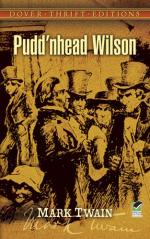“Here is a record of an incident which you would perhaps not wish me to—”
“Bring it out,” said Luigi, good-naturedly. “I promise you sha’n’t embarrass me.”
But Wilson still hesitated, and did not seem quite to know what to do. Then he said:
“I think it is too delicate a matter to—to—I believe I would rather write it or whisper it to you, and let you decide for yourself whether you want it talked out or not.”
“That will answer,” said Luigi. “Write it.”
Wilson wrote something on a slip of paper and handed it to Luigi, who read it to himself and said to Tom:
“Unfold your slip and read it, Mr. Driscoll.”
Tom said:
“’IT WAS PROPHESIED THAT I WOULD KILL A MAN. IT CAME TRUE BEFORE THE YEAR WAS OUT.’”
Tom added, “Great Scott!”
Luigi handed Wilson’s paper to Tom, and said:
“Now read this one.”
Tom read:
“’YOU HAVE KILLED SOMEONE, BUT WHETHER MAN, WOMAN, OR CHILD, I DO NOT MAKE OUT.’”
“Caesar’s ghost!” commented Tom, with astonishment. “It beats anything that was ever heard of! Why, a man’s own hand is his deadliest enemy! Just think of that—a man’s own hand keeps a record of the deepest and fatalest secrets of his life, and is treacherously ready to expose himself to any black-magic stranger that comes along. But what do you let a person look at your hand for, with that awful thing printed on it?”
“Oh,” said Luigi, reposefully, “I don’t mind it. I killed the man for good reasons, and I don’t regret it.”
“What were the reasons?”
“Well, he needed killing.”
“I’ll tell you why he did it, since he won’t say himself,” said Angelo, warmly. “He did it to save my life, that’s what he did it for. So it was a noble act, and not a thing to be hid in the dark.”
“So it was, so it was,” said Wilson. “To do such a thing to save a brother’s life is a great and fine action.”
“Now come,” said Luigi, “it is very pleasant to hear you say these things, but for unselfishness, or heroism, or magnanimity, the circumstances won’t stand scrutiny. You overlook one detail; suppose I hadn’t saved Angelo’s life, what would have become of mine? If I had let the man kill him, wouldn’t he have killed me, too? I saved my own life, you see.”
“Yes, that is your way of talking,” said Angelo, “but I know you—I don’t believe you thought of yourself at all. I keep that weapon yet that Luigi killed the man with, and I’ll show it to you sometime. That incident makes it interesting, and it had a history before it came into Luigi’s hands which adds to its interest. It was given to Luigi by a great Indian prince, the Gaikowar of Baroda, and it had been in his family two or three centuries. It killed a good many disagreeable people who troubled the hearthstone at one time or another. It isn’t much too look at, except it isn’t shaped like other knives,




